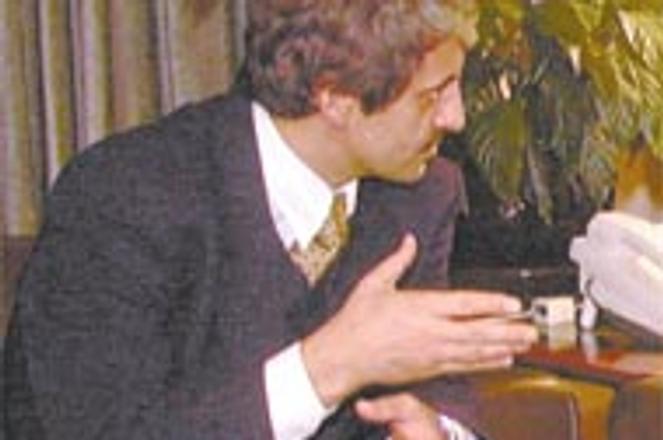Sales pitch. Premier Mikuláš Dzurinda (left) explains to NATO Secretary General Javier Solana why Slovakia should be admitted early.TASR
The European Commission has proposed that a joint high-level working group be established with Slovakia to remove hurdles from the country's path to membership in the European Union.
The proposal came during an official November 5-6 visit to Brussels by representatives of the country's newly elected government. The group, including Premier Mikuláš Dzurinda, was visiting EU and NATO headquarters to discuss the cabinet's efforts to have Slovakia moved up to the group countries considered to be front-runners for integration.
"The offer to create a special working group is exceptional," said Ján Figeľ, state secretary at the Foreign Ministry and Slovakia's main negotiator for EU entry. "It's not a usual EU measure, so Slovakia should grab the big challenge it has been offered."
Figeľ explained that the working group would focus on monitoring developments in Slovakia with special emphasis on the implementation of EU norms in legislation, economy and local administration.
In December 1997, Slovakia was dropped from the group of nations considered to be favorites for accession to the EU, having suffered the same fate at NATO's Madrid summit in July 1997. Both alliances criticised the government of then-Premier Vladimír Mečiar for backsliding on democratic reforms.
Figeľ was accompanied to Brussels by Dzurinda, Vice Premier for European Integration Pavol Hamžík and Foreign Minister Eduard Kukan. The Slovak delegation met with the most influential figures in the western alliances it was courting - José Maria Gil-Robles, the speaker of the European Parliament, EU High Commissioner Hans van den Broek and European Commission Chairman Jacques Santer, as well as NATO Secretary General Javier Solana.
On his return, Dzurinda reiteratedhis government's committment to EU and NATO integration. "The future of Slovakia lies in integration, and there is no other option," Dzurinda told parliament on November 10.
Dzurinda also reported that EU and NATO officials had been pleased with the recent political changes in Slovakia, and had said they believed the country would soon become a hot candidate for entry to either of the structures. Vice Premier Hamžík said that the EC had been particularly happy with the presence of the Hungarian Coalition Party (SMK) in the new government and the significant role offered to the opposition in the Slovak parliament.
The EU's van den Broek, however, was less fulsome, saying only that the visit of the Slovak delegation had been "an opportunity to intensify the relationship between Slovakia and the EU." NATO boss Solana, for his part, said that "while it is in NATO's interest that Slovakia catches up with what it missed, this does not mean that Slovakia will become a NATO member tomorrow."
European Parliamentarian Gil-Robles, meanwhile, said that Slovakia should use the chance it had been given to prepare for entry by 2003-2004, but warned that membership approval would depend on how much progress the country had made in making the required changes and maintaining economic and political stability.
But the Slovak delegates, delighted with the results of their visit, could not hide their optimism. "The key to the door of EU entry is here in Slovakia," said Figeĺ, adding that cabinet would organise presidential elections and make changes to economic legislation in order to satisfy EU demands as soon as possible. "Each of these steps requires a certain time-span, so we cannot expect immediate change," he said.
In its recent November 4 report, the European Commission did not recommend that Slovakia be included for direct talks on EU expansion, saying the country had not met the EC's political and economic criteria.
"The latest assessment report concerns the period from the second half of 1997 until now, and the only positive moment of the entire period was the result of the [September] national elections," said František Šebej, a deputy for the SDK party and Chairman of the Parliamentary European Integration Committee. "The election results were not a sufficient reason for changing the EC's opinion on Slovakia's fulfillment of political and economic criteria," Šebej added.
Ľuboš Kubín, a political scientist at the Slovak Academy of Sciences, argued that Slovakia had to be realistic about its chances for EU entry. "It can be expected that negotiations will be intensified, but the actual time of entry exceeds the election term of the current government," Kubín said.
Kubín explained that the integration process with NATO would be especially arduous, as the acceptance of new members required the approval of all NATO member countries. In negotiating such wide acceptance, Kubín argued, Slovak politicians would be held back by their lack of political culture and diplomatic experience.
"Slovakia is a rookie in foreign policy, as it has always been part of a bigger state," Kubín said, adding that top Slovak politicians still suffered from a stature gap in the eyes of their more experienced western counterparts.


